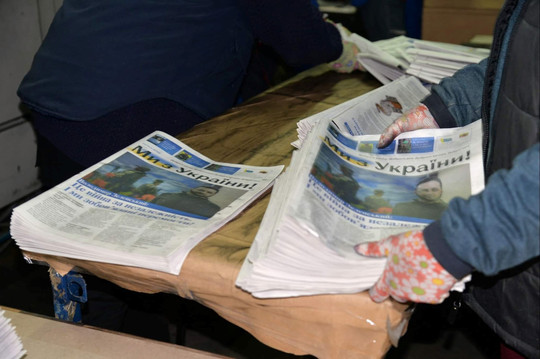1. Could you talk to us about the publication of "Ми з України!!" (“We are from Ukraine!”)
The magazine “We are from Ukraine!” came from a very simple idea: at the very beginning of the war, our union contacted Sergiy Tomilenko, a colleague and friend. We wanted to ask him what, as journalists, we could do together, to help, and how could journalists keep working during war times. All kinds of digital media were being switched off at the time: TV, radios, mobile providers… Sergiy, and many colleagues, were faced with the issue of having very little access to information.
2. Could you expand on the collaboration between NUJU and your union?
Sergiy and I talked daily. We wanted to get local journalists involved in the project. We thought of a historical example: in 1991, when the Press House building here in Vilnius was occupied by Soviet troops, Russian, Polish, Lithuanian colleagues joined and together published a newspaper called “Free Lithuania ''. The newspaper was popular amongst society members. We thought we could use that example, transposing it in the 21st century: going back to printed editions, “old-fashioned” or “traditional”. If all digital platforms are switched off, let’s go back to print media.
All the work done was volunteer work. Sergiy and I thought we should not work as fast as possible, as journalism often does: we can write stories quickly, but the idea was to involve more colleagues than just the two of us, and work collaboratively and in cooperation. The first week of the collaboration was directed towards discussions and coordination. We talked to publishers and associations of media, and we thought it best if all organisations helped collect some money as an act of solidarity. Small media outlets, small print houses close to the Baltic sea said they can print this newspaper for free if needed. We also found some print houses in Ukraine. There, the work was almost done in secret, because the war had just started and we did not know what would happen to the publishing houses.
3. How were the journalists writing for the newspaper selected, and were some of them still living in Ukraine?
What happened is that we joined forces in order to provide information about what was happening in Ukraine, and what was happening outside of Ukraine: how people were reacting, how society was reacting… We decided to put together a group of people: we invited our colleagues from Ukraine who speak Russian, English, Lithuanian and Ukrainian because we thought the information would be worth being shared in other languages to other audiences. One of our first decisions was that one editor in chief was to come from Lithuania, and one from Ukraine. We also decided that the name of the newspaper was to be decided on by our Ukrainian colleagues. The main idea was to show that even during war times, we, as journalists, will do our best to provide information. From the beginning, Russian speaking media in Lithuania were very reactive in helping colleagues in Ukraine, showing it was about journalism.
The newspaper is still sometimes published.
To support IFJ/EFJ work in Ukraine, donate to Safety Fund for Journalists in Ukraine

